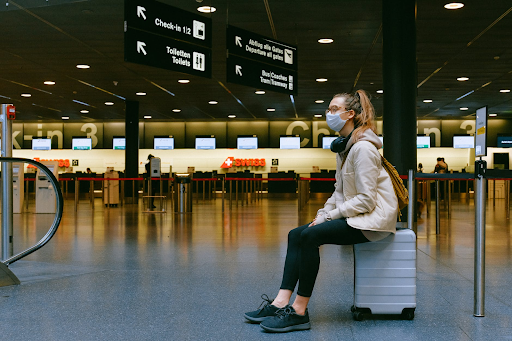Everyone remembers the early days of the pandemic when the world shut down, planes were grounded, and everyone was instructed to stay home. Now, people are slowly getting back to the activities they once loved before the pandemic, and learning to live life in the new world.
For avid travelers, staying home and not exploring the world or visiting distant family has been a challenge. If you’re ready to brave the new world and start jet-setting again, practice these key safety tips to stay healthy throughout your journey.
Put Together a Travel Health Kit
One of the best things you can do for yourself when traveling is to assemble a travel health kit. You can put this together in an individual makeup bag or a TSA-approved zip-top bag to keep with you at all times.
Your COVID-friendly travel health kit should include hand sanitizer, extra face masks, a few easy at-home COVID-19 test kits, tissues, antiseptic wipes, gloves, and a small thermometer. You should also consider putting an emergency contact card in the kit with information about health centers at your destination and important phone numbers. These little kits also make great gifts for the other travelers in your life.
Research Your Destination Before You Go
The thought of canceling a trip last minute can be devastating. However, it’s important to be ready for this scenario when traveling in the pandemic world. As we’ve seen, things can change quickly. Determine the situation in your destination in the weeks before you leave for your trip. If things are worse at home, it’s even more important to use your test kits before you go.
It’s also integral to know what’s expected of you before you head to your destination. Different countries have unique entry requirements regarding vaccination status, isolation requirements, and testing requirements. Ensuring you know what needs to be done will help mitigate any costly or frustrating delays.
Invest in Travel Insurance
Never has travel insurance been more valuable than it is currently. It’s essential to look at insurance options and cancellation policies before booking your trip, as some airlines cover COVID-related cancellations and others don’t.
In addition to covering your flight costs, you’ll want to invest in additional health coverage for your travels. Some insurance providers offer global coverage, while others require an additional payment. If you don’t currently have coverage, you should consider it before you go. If you’re traveling to a country with universal healthcare, confirm that the coverage applies to you.
Maximize Your Distance
Social distancing has proven to be the most effective way to avoid getting COVID as you travel. While it may seem silly to concern yourself with social distancing when you’re about to board a plane with hundreds of other people, minimizing touchpoints whenever possible makes a difference.
Try to keep your distance from people in the airport, and avoid crowded areas when you can throughout your travels. If possible, opt for outdoor attractions over cramped indoor sights — the Mona Lisa is smaller than you’d think anyway.
Keep Your Mask on
While masks are a polarizing subject and even avid mask wearers are sick of them at this point, it’s worth the extra protection to keep yours on whenever possible, especially in busy areas. In addition to minimizing your risks of getting COVID-19, it will help prevent you from passing it on if you pick it up asymptomatically. Remember to bring some extra disposable masks as well in case you drop or lose yours.
Keep Your Hands Busy
For many people, being told not to touch their face led to more unconscious face touching than ever before. The less you touch things in tourist areas and airports, the less likely you are to contract the virus (or any other illness).
One strategy for preventing yourself from touching everything is to keep your hands busy. Keep your documents, a phone, or a tropical drink in your hand, so you’re less likely to impulsively touch things. It’s simple, but it makes a difference.
With these practical strategies, you can improve your chances of staying healthy while traveling during a global pandemic.

